 When it comes to personalized oral health care, there are many treatments that you’ll never need to undergo. However, some of the less commonly recommended oral health procedures are also those that, when recommended, can be the most essential measures for preserving and protecting your long-term oral health. For example, there are multiple conditions that might lead to the erosion of your jawbone structure, which serves as the foundation of your smile. If you experience one of these concerns, then you might require surgical jawbone grafting to address it and restore your smile’s healthy, strong foundation. (more…)
When it comes to personalized oral health care, there are many treatments that you’ll never need to undergo. However, some of the less commonly recommended oral health procedures are also those that, when recommended, can be the most essential measures for preserving and protecting your long-term oral health. For example, there are multiple conditions that might lead to the erosion of your jawbone structure, which serves as the foundation of your smile. If you experience one of these concerns, then you might require surgical jawbone grafting to address it and restore your smile’s healthy, strong foundation. (more…)
Common Dental Conditions that Can Lead to Oral Surgery
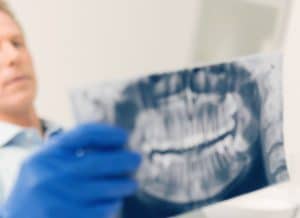 When patients require oral surgery to address a specific oral health concern, it’s often for a serious condition that their general dentists can’t successfully address in their offices. However, for many patients, their condition wasn’t always that serious, and oral surgery wasn’t always the necessary course of action. Today, we examine how a few common dental conditions can become serious enough to lead to oral surgery, and why it’s important to treat the condition as soon as possible. (more…)
When patients require oral surgery to address a specific oral health concern, it’s often for a serious condition that their general dentists can’t successfully address in their offices. However, for many patients, their condition wasn’t always that serious, and oral surgery wasn’t always the necessary course of action. Today, we examine how a few common dental conditions can become serious enough to lead to oral surgery, and why it’s important to treat the condition as soon as possible. (more…)
The Difference that Dental Implants Make for Your Smile
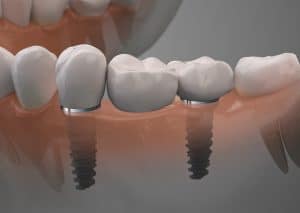 These days, people have a several different options for rebuilding their smiles after they’ve experienced tooth loss. In most cases, the choice mainly comes down to how many teeth you’ve lost, which can determine whether you need a dental bridge, partial denture, or complete denture to replace them. However, for many patients, there’s another, more profound choice – whether to support their custom restoration on an appropriate number of dental implant posts. A dental implant-supported restoration is a dental crown, bridge, or denture that’s supported on one or more root-like posts. Though seemingly small, this key difference equates to multiple, significant advantages for your immediate and long-term oral health. (more…)
These days, people have a several different options for rebuilding their smiles after they’ve experienced tooth loss. In most cases, the choice mainly comes down to how many teeth you’ve lost, which can determine whether you need a dental bridge, partial denture, or complete denture to replace them. However, for many patients, there’s another, more profound choice – whether to support their custom restoration on an appropriate number of dental implant posts. A dental implant-supported restoration is a dental crown, bridge, or denture that’s supported on one or more root-like posts. Though seemingly small, this key difference equates to multiple, significant advantages for your immediate and long-term oral health. (more…)
Why Preventing Tooth Loss Matters to Your Smile Long-Term
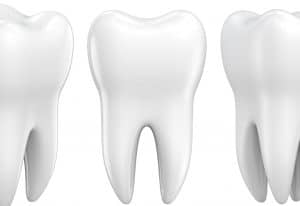 When patients experience tooth loss, the best thing they can do for their smiles is to replace their lost teeth as soon as possible. For example, with a custom-designed dental implant restoration, they can replace all of their lost tooth’s structure, including the root, to help restore their bite’s full functionality and preserve their smiles more effectively. However, for many people, the loss of a tooth is something that could be prevented, especially if it’s the result of a severe, chronic underlying concern (such as gum disease). Today, we explore why preventing tooth loss matters to your smile long-term, and how it can help you preserve more than you might expect. (more…)
When patients experience tooth loss, the best thing they can do for their smiles is to replace their lost teeth as soon as possible. For example, with a custom-designed dental implant restoration, they can replace all of their lost tooth’s structure, including the root, to help restore their bite’s full functionality and preserve their smiles more effectively. However, for many people, the loss of a tooth is something that could be prevented, especially if it’s the result of a severe, chronic underlying concern (such as gum disease). Today, we explore why preventing tooth loss matters to your smile long-term, and how it can help you preserve more than you might expect. (more…)
The Common Problem People Have with Wisdom Teeth
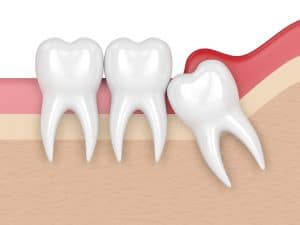 When they’re healthy, most of your natural teeth shouldn’t cause you any problems. Keeping them consistently healthy can help you continue avoiding most of the issues that could threaten your smile. However, this isn’t always true in the case of wisdom teeth, or third molars. For many people who develop them, wisdom teeth can become highly problematic, and there is often no way to restore or fix them. When this occurs, the most frequent solution is to surgically remove the molars that have become impacted. (more…)
When they’re healthy, most of your natural teeth shouldn’t cause you any problems. Keeping them consistently healthy can help you continue avoiding most of the issues that could threaten your smile. However, this isn’t always true in the case of wisdom teeth, or third molars. For many people who develop them, wisdom teeth can become highly problematic, and there is often no way to restore or fix them. When this occurs, the most frequent solution is to surgically remove the molars that have become impacted. (more…)
What Does It Mean When Your Bite Is Imbalanced?
 Balance and symmetry are extremely importance concepts when it comes to your oral health and bite function. They’re also complicated concepts that can be impacted by a variety of different issues with your oral health and structures, some of which may be serious enough to require oral surgery to correct. Today, we take a look at a few of these impacts, and what it could mean for your oral health if your bite becomes imbalanced in one of these ways. (more…)
Balance and symmetry are extremely importance concepts when it comes to your oral health and bite function. They’re also complicated concepts that can be impacted by a variety of different issues with your oral health and structures, some of which may be serious enough to require oral surgery to correct. Today, we take a look at a few of these impacts, and what it could mean for your oral health if your bite becomes imbalanced in one of these ways. (more…)
Other Parts of Your Smile that React to Tooth Loss
 Given the intricate nature of how your oral structures and tissues are connected, most oral health problems can have greater consequences than what you can immediately notice. This is true of common conditions like periodontal disease, which affects your gum tissues but is the most frequent cause of tooth loss. It’s also true for more severe conditions, such as the loss of one or more of your teeth, regardless of the reason. Today, we explore a few other parts of your smile that react to tooth loss, and how those reactions can influence your long-term oral health. (more…)
Given the intricate nature of how your oral structures and tissues are connected, most oral health problems can have greater consequences than what you can immediately notice. This is true of common conditions like periodontal disease, which affects your gum tissues but is the most frequent cause of tooth loss. It’s also true for more severe conditions, such as the loss of one or more of your teeth, regardless of the reason. Today, we explore a few other parts of your smile that react to tooth loss, and how those reactions can influence your long-term oral health. (more…)
Surgically Extracting Teeth Besides Impacted Molars
 When a wisdom tooth, or third molar, becomes impacted behind another molar or within your jawbone structure, extracting it requires performing minor oral surgery to expose and remove the tooth’s structure. When surgical tooth extraction is required, this is one of the most frequent reasons why. However, it isn’t the only reason, and for some patients, surgical extraction may be necessary for one or more teeth that aren’t third molars. Today, we examine a few situations in which surgically extracting a tooth could be the best thing for your smile and oral health. (more…)
When a wisdom tooth, or third molar, becomes impacted behind another molar or within your jawbone structure, extracting it requires performing minor oral surgery to expose and remove the tooth’s structure. When surgical tooth extraction is required, this is one of the most frequent reasons why. However, it isn’t the only reason, and for some patients, surgical extraction may be necessary for one or more teeth that aren’t third molars. Today, we examine a few situations in which surgically extracting a tooth could be the best thing for your smile and oral health. (more…)
A Look at Smile Restoration with Dental Implants
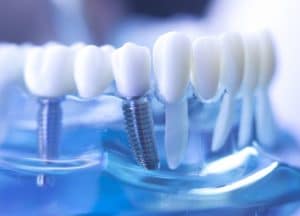 Smile restoration is the kind of dental treatment that means different things to different people, and in some cases, can require the help of a dental health specialist. For example, if you’ve experienced tooth loss, then the most effective way to restore your smile may be to replace your lost teeth with a dental implant restoration. Today, we examine what it means to restore a smile that’s lost one or more teeth, and why dental implants can offer the most successful immediate and long-term results for your smile. (more…)
Smile restoration is the kind of dental treatment that means different things to different people, and in some cases, can require the help of a dental health specialist. For example, if you’ve experienced tooth loss, then the most effective way to restore your smile may be to replace your lost teeth with a dental implant restoration. Today, we examine what it means to restore a smile that’s lost one or more teeth, and why dental implants can offer the most successful immediate and long-term results for your smile. (more…)
Serious Concerns that Could Require Oral Surgery
 When oral surgery is recommended, it’s typically because the problem that the patient exhibits is too severe or complex to address with more general dental treatments. Given the specific nature and severity of the condition itself, oral surgery could help stop it from having increasingly more complicated effects on your oral health. Today, we examine a few concerns that may be serious enough to warrant oral surgery, and the complications that might arise if they’re not addressed promptly. (more…)
When oral surgery is recommended, it’s typically because the problem that the patient exhibits is too severe or complex to address with more general dental treatments. Given the specific nature and severity of the condition itself, oral surgery could help stop it from having increasingly more complicated effects on your oral health. Today, we examine a few concerns that may be serious enough to warrant oral surgery, and the complications that might arise if they’re not addressed promptly. (more…)


